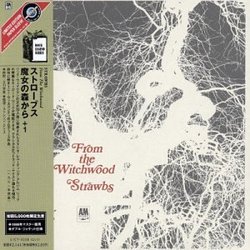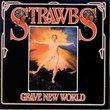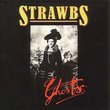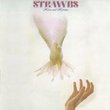| All Artists: Strawbs Title: From the Witchwood Members Wishing: 5 Total Copies: 0 Label: Universal Release Date: 8/12/2003 Album Type: Import Genres: Folk, International Music, Rock Styles: British & Celtic Folk, Folk Rock, Progressive, Progressive Rock Number of Discs: 1 SwapaCD Credits: 1 UPC: 766482704644 |
Search - Strawbs :: From the Witchwood
 | Strawbs From the Witchwood Genres: Folk, International Music, Rock
Limited edition Japanese remastered reissue of 1971 album, packaged in a miniature LP gatefold sleeve features 11 tracks including 1 bonus track, 'Keep The Devil Outside'. Universal. 1998. |
Larger Image |
CD DetailsSynopsis
Album Description Limited edition Japanese remastered reissue of 1971 album, packaged in a miniature LP gatefold sleeve features 11 tracks including 1 bonus track, 'Keep The Devil Outside'. Universal. 1998. Similar CDs
|
CD ReviewsThe Strawbs straddle the realms of folk rock and (slightly p Jeffrey J.Park | Massachusetts, USA | 04/28/2007 (5 out of 5 stars) "I really enjoy the music of the Strawbs and especially appreciate their proggier works from the 1972-1975 timeframe, i.e. Grave New World through Ghosts). From the Witchwood (1971) is slightly different from those later works in that the folk rock influences are much stronger and even psychedelic pop influences are present. Specifically, there are vocal harmonies that remind me of Rubber Soul and Revolver-era Beatles and there is even a fleeting reference to the Jefferson Airplane track White Rabbit. Overall, I find this album to be a great example of English folk rock with some touches of prog rock. The lineup on From the Witchwood includes Rick Wakeman (Hammond organ; mellotron (mostly with string setting); harpsichord; mini moog synthesizer; and clarinet); Dave Cousins (vocals acoustic and electric guitar; banjo; dulcimer; tenor recorder); Richard Hudson (drums; vocals; sitar); John Ford (electric bass; vocals); and Tony Hooper (vocals; autoharp; acoustic guitar; tambourine). This would be the last Strawbs album with Rick Wakeman before he joined prog rock giant Yes for their Fragile album. From a quick glance at the instruments these guys were using, it becomes clear that an interesting mixture of the exotic; the "very old"; and the cutting edge were used to make this album. The use of the sitar on the album is pretty unusual in that scales typically associated with eastern music are not used - rather, the instrument is used to play more straightforward melodies associated with western rock music. Rick Wakeman does stand out though. In fact, his lightning fast and virtuosic runs on the Hammond organ and mini moog seem to be just a little bit at odds with the generally folky, pastoral and psychedelic feel of this album. Although I have been using descriptive terms like folky and pastoral, this was the first Strawbs album to feature a drum kit and some of the songs are pretty "rocking". Dave does note that they were a little nervous how their predominantly folk oriented audience might react to a drum kit, so the drums are mixed down a bit. However, John's bass work is especially heavy and really contributes to the rock element along with the electric guitars. Musically, this is a great album of folk rock that took a giant leap into the rock realm. There are some proggy touches here and there courtesy of Rick's phenomenal technique and the equipment he used including the mellotron and the mini-moog. The arrangements themselves are also pretty interesting too and are at times very haunting and gloomy, yet occasionally upbeat. From the Witchwood also features some nice, pastoral moments that were holdovers from the purely folk rock approach of albums including Strawbs (1969) and Dragonfly (1970) and the group even worked psychedelic flourishes into the music here and there. Most importantly though, From the Witchwood is a very even album with all of the tracks more or less "on the same page" - I say this in spite of the fact that some folks do not like the tracks written by members other than Dave Cousins. I also appreciate the vocals - while Dave does have a somewhat unusual voice, the vocal harmonies with the other members are superb and at times sound reminiscent of early English folk music. This remastered album is excellent and features restored cover art and loads of informative liner notes and excellent sound quality (Tony Visconti was a great producer). The bonus track was written by John Ford and was not included on the original album because of the time limitations imposed by the vinyl LP format. The track is very good. Well there you have it. This is a great folk rock album with some proggy flourishes here and there that demonstrates the proggier direction that the group was heading in. From the Witchwood is very highly recommended to prog fans that do not mind their prog on the folk rock side along with Grave New World (1972); Hero and Heroine (1974); and Ghosts (1975)." My first try at the Strawbs BENJAMIN MILER | Veneta, Oregon | 07/27/2006 (4 out of 5 stars) "The Strawbs was one of those bands I knew of forever, but never owned any of their albums, until now. Well, better late than never. From the Witchwood was their last album with Rick Wakeman. The rest of the group at that time consisted of Dave Cousins, Tony Hooper, Richard Hudson, and John Ford. The Strawbs were unlike many of their other British folk-rock contemporaries like Fairport Convention or Steeleye Span. For one thing, they did not touch on centuries old folk songs, jigs and reels, and mainly stuck to compositions written by band members. Mellotron was totally alien on any given Fairport or Steeleye Span album. Plus they wanted to explore prog rock, while at the same time not forsaking their folk roots.
From the Witchwood was their fourth album, and while mainly sticking to a folk-rock sound, started showing some progressive tendencies. This was their first album where the Mellotron was used, although just on one cut, "The Shepherd's Song". Wakeman did not stick around long enough to watch the band get more progressive, we all know what happened: he hopped board to Yes, where his keyboards (Moog, Mellotron, Hammond organ) was put to much greater use in that group. Yes was not happy with Tony Kaye, who was reluctant to play Moog on The Yes Album, and Wakeman's presence in Yes resulted in some of that band's finest albums (Fragile, Close to the Edge). Of course it was with Wakeman's stay with the Strawbs that allowed him to record his solo albums on A&M (which the Strawbs recorded for). "A Glimpse of Heaven" was one of the band's singalongs they had a habit of including on many of their albums (like "Part of the Union" off Bursting at the Seams or "Shine on Silver Sun" off Hero and Heroine). Dave Cousins vocals sounds to me like a cross between Peter Gabriel and of Cat Stevens. "Witchwood" is a nice, pleasant folk-rock piece with mandolin. Some people would state that the songs not written by Dave Cousins were not the album's finest, but I can't say that they're bad. "Thirty Days" (Ford), "Flight" (Hudson), and "Canon Dale" (Hudson) might not be up to the quality of the songs written by Cousins, they're not bad. "Canon Dale" is a rather odd experimental psychedelic piece complete with sitar. "The Hangman and the Papist" is one of the album's high points, and it's little wonder it was a staple in the band's live repertoire. "The Shepherd's Song" is one of the first serious attempts at the band exploring prog rock. Here Wakeman uses his Mellotron to good use. I can't help but be reminded of the Moody Blues here, but then suddenly there's this Spanish feel to it, and during this part, Wakeman whips out his Moog. "In Amongst the Roses" goes back to folk music, but is a truly stunning acoustic piece. It might not be their most progressive album (despite the presence of Wakeman), but the music is great, although the production isn't that great. Still, you need this album if you're a Strawbs fan." |

 Track Listings (11) - Disc #1
Track Listings (11) - Disc #1

